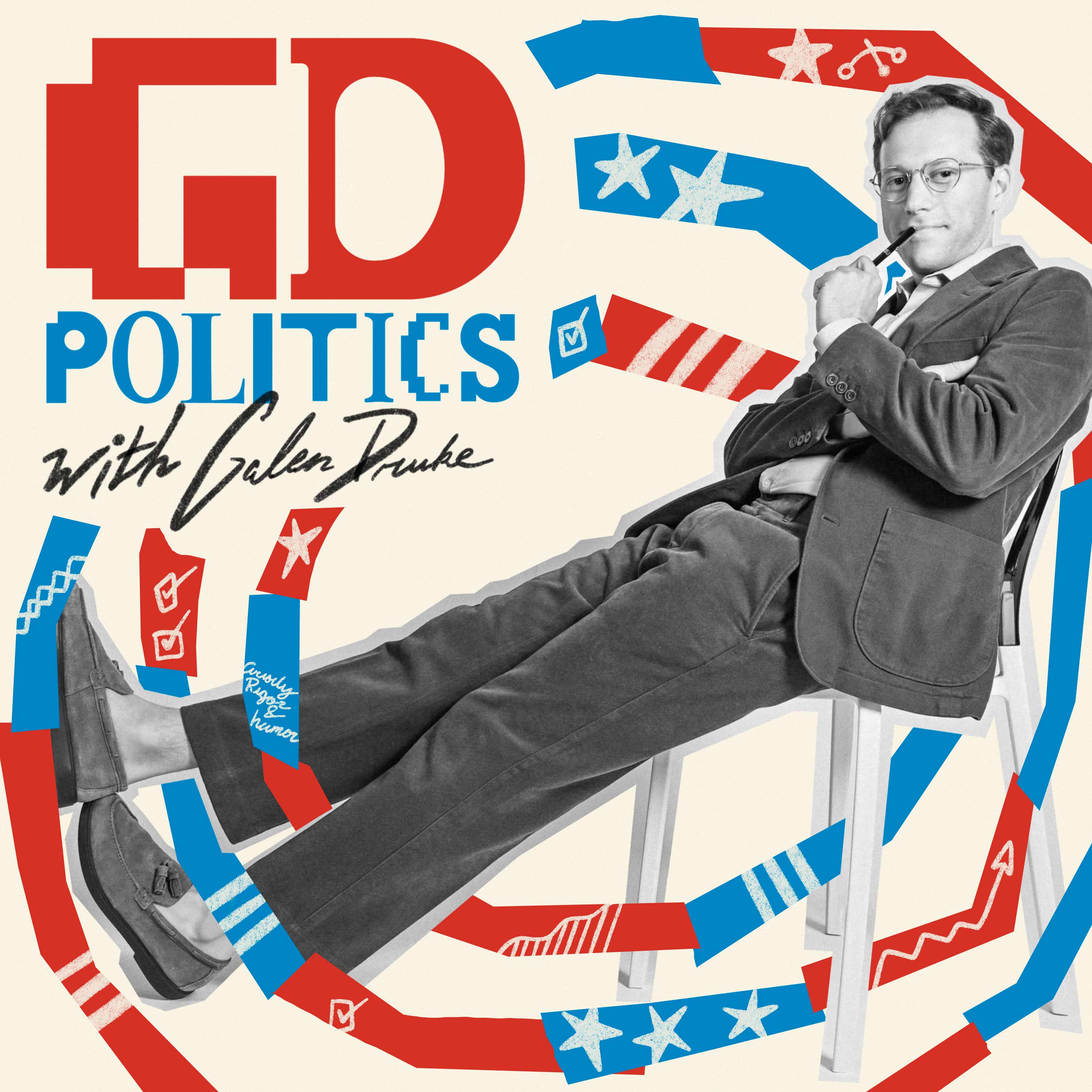

GD POLITICS
Galen Druke
Making sense of politics and the world with curiosity, rigor, and a sense of humor. www.gdpolitics.com
Episodes
Mentioned books

Jan 29, 2026 • 31min
A 2028 Democratic Primary Draft (Live!)
Claire Malone, reporting-based political commentator, joins Nate Silver, data-driven poll analyst. They open with a sober conversation about Alex Preddy’s killing and its political reverberations. Then they turn playful with a live 2028 Democratic primary draft, debating likely contenders, strategic picks, and what shapes momentum in a crowded field.

Jan 26, 2026 • 47min
Is Alex Pretti's Killing A Turning Point?
Nathaniel Rakich, managing editor at Votebeat and data-focused political analyst, and Mary Radcliffe, head of research at FiftyPlusOne and polling expert, unpack two recent federal immigration shootings in Minneapolis. They discuss Republican pushback, the role of video evidence, polling on immigration and enforcement, potential protests and funding fights, and whether this moment could shift politics ahead of 2026.

Jan 21, 2026 • 1h 4min
Judging Trump 2.0 By His Own Standards
Gabe Fleischer, a political commentator and author of Wake Up To Politics, joins the discussion to assess the first year of Trump's second term. They explore Trump's 'unleashed' presidency and how rapid-fire announcements bewilder Congress and the public. The duo debates immigration policy successes, economic fallout from tariffs, and the mixed results of Trump's anti-elite promises. They also analyze the shifting foreign policy dynamics and the pivotal role of courts amidst numerous legal challenges, raising questions for the future.

Jan 19, 2026 • 48min
We Answer Your Questions On Independents, Never Trumpers, And Zohran Mamdani
Lenny Bronner, a senior data scientist at The Washington Post, joins to tackle unique listener questions. They dive into the record rise of independents and what it means for future elections. The discussion highlights how Republicans who disapprove of Trump tend to be former supporters rather than lifelong Never Trumpers. They also analyze the recent polling shifts after the 2025 elections, share insights on politicians' rebranding efforts, and offer career advice for recent grads. It's a thought-provoking dive into the current political landscape!

8 snips
Jan 15, 2026 • 21min
We Answer Your Questions On ICE, Iran, And The Senate
Lenny Bronner, a Senior data scientist at The Washington Post, joins to unpack current political trends. He delves into the recent surge of ICE activities in Minneapolis, highlighting shifting public attitudes driven by partisan divisions. The conversation turns to Mary Peltola's Senate prospects in Alaska, with Lenny suggesting tough odds for Democrats. They also discuss the implications of immigration issues on Trump's approval ratings and the impact of poll responses in minority communities amidst heightened public scrutiny.

Jan 12, 2026 • 42min
Can A Former Republican Win Georgia For Democrats?
Geoff Duncan, former Republican lieutenant governor of Georgia turned Democrat, dives into his political transformation and ideas on unifying voters. He discusses his resistance to Trump's claims in the 2020 election and explains his decision to leave the GOP due to its direction. Duncan shares his vision for a gubernatorial campaign focused on affordability and healthcare, aiming to attract independents and disenchanted Republicans. He also addresses shifting stances on abortion and immigration while expressing concerns about GOP chaos.

Jan 8, 2026 • 53min
How Denmark Sees Trump’s Greenland Threats
Peter Viggo Jakobsen, a Professor of Strategy and War Studies at the Royal Danish Defence College, discusses the bizarre interest in Greenland from the U.S. government. He explains the historical context of Danish sovereignty over the island and why military annexation would make little sense for the U.S. He delves into the political responses from Denmark and Greenland, highlighting the strong rejection of any takeover attempts. Jakobsen also addresses the strategic implications of Greenland's mineral wealth versus economic realities and the broader geopolitical tensions at play.

Jan 5, 2026 • 50min
How Americans View U.S. Involvement in Venezuela
Mary Radcliffe, Head of research at 50+1, and Nathaniel Rakich, Managing editor at Votebeat, dive into the recent U.S. strikes in Venezuela, analyzing how polling reflects public opinion on military action. They explore the split in support among political parties and the historical parallels with past interventions. The discussion includes concerns about the U.S. motivations—oil versus democracy—and potential public backlash against prolonged involvement. The implications of the Monroe Doctrine and public attitudes towards occupation are also dissected, blending sharp analysis with insightful data.

8 snips
Dec 29, 2025 • 42min
The 10 Numbers That Defined 2025
Nathaniel Rakich, Managing Editor at VoteBeat, and Mary Radcliffe, Head of Research at 50+1, dive into the numbers that shaped 2025. They tackle topics like the political fallout of a 43-day government shutdown and the implications of 225 executive orders signed by Trump. Mary discusses the impact of redistricting on future elections, while Nathaniel reveals how 62% of adults are now interacting with AI regularly. They also explore the economic and political significance of a $3.4 trillion deficit increase tied to major legislation.

Dec 23, 2025 • 5min
'Roman Empire' Elections Part 2
In this engaging discussion, Jacob Rubashkin, a political election expert, and Leah Askarinam dive deep into quirky historical elections. They reveal the bizarre nomination of Andrew Johnson in 1864, who infamously took his oath while drunk. The conversation also highlights the unique case of a deceased candidate winning a Senate race and speculates on how the political landscape might differ had Mitt Romney secured the presidency in 2012. A fascinating mix of humor and political insight awaits!


